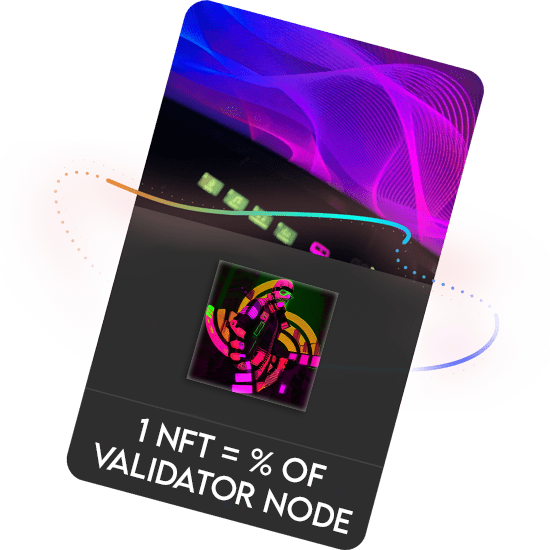STAKING – REWARDS – VALIDATOR NODE WITH
NFT NODES
Would you like to get started with validator nodes but don’t know how?
You’ve come to the right place! What could be more fun than a nft to represent your share of the validator node?

UP TO APR
Available nodes
DATA MAX / node
AVAILABLE NODES

Live
STREAMR – Data Token

Soon
COMING SOON

Soon
COMING SOON
FAQ
- What's a validator node ?
- What Is a Validator’s Commission Rate?
- How to Run a Validator
- Why use NFT Nodes ?
A blockchain validator is a node on a blockchain network that is responsible for verifying transactions on the network. — Validators are an essential component of a blockchain network, helping to ensure its security, accuracy, and reliability.
Each validator node keeps a copy of the ledger and constantly communicates with the other nodes in the network as a means of ensuring that all of the copies are consistent as new data gets added. Because the entire ledger is not in control by one entity, however, it is in control by a distributed network of validators; this results in the network requiring less trust than the traditional alternative and makes the network censorship resistant. These are responsible for blockchain validation.
This is something that is unique to every single blockchain out there. It is important to note that each blockchain has its own consensus mechanism and, as such, has its own token allocation program.
However, let’s use some blockchains as an example of how much their validators get in terms of commission fees, just so that everyone can have a higher level of understanding as well as a broader perspective as to how all of this would works.
- Networks such as NEAR protocol, for example, will typically allow their validators to charge a commission on the delegation staked to their node. Every validator can, essentially, decide their own commission fee structure. However, the typical fee is in the region of 5%.
- Polygon is another example, where every validator is entitled to charge a commission rate, where the minimum can be 0%, and can go to a maximum commission of 100% of the rewards that have been earned on top of the network. Remember that this is unique to every network.
- Typically, a validator node will have specific hardware requirements that need to be fulfilled prior to it even launching. These will be in the form of Central processing unit (CPU) requirements, Random-access memory (RAM), DISK, and Graphics processing units (GPUs).

2. This is followed up by software requirements, where the user in question that wants to set up the validator node will typically be prompted to install a specific operating system, such as Ubuntu (Linux) for example, alongside other prebuilt binaries.
3. Then there are the networking settings that need to be configured. Typically, each validator node will need to be connected to ports in order to be open to the internet for both inbound and outbound connections.
4. This is followed by system tuning, where every single network will typically have its own procedure through which it can complete this goal.
If you look at the previous tab, you’ll see that set-up can be tedious and time-consuming, requiring high financial resources and significant power consumption.
That’s why we’re offering you the opportunity to acquire a % of a validator node by purchasing an NFT, just like a traditional transaction on the blockchain. So you can easily earn rewards with a high APR %.
